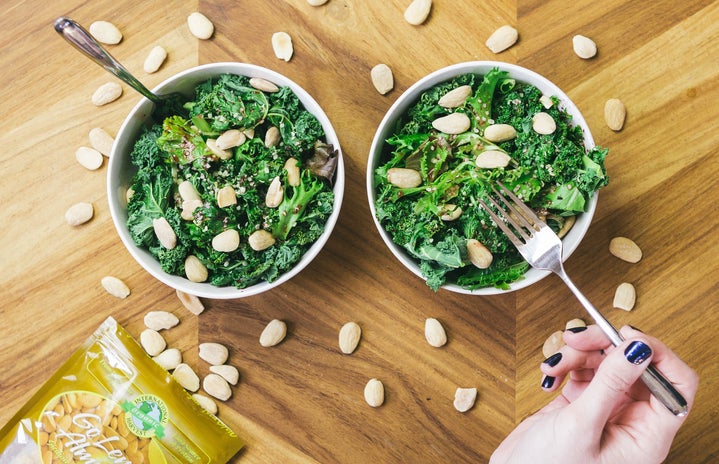Being quarantined in 2020 has become something usual for many people around the world, and while we are all unable to walk freely and live our usual lives, our planet is still suffering. Glaciers are melting, sea levels are rising, forests are dying, and wildlife is suffering, consequently, human life is also affected by these aggravating changes.
Climate change happens because of the excess of gases that trap heat into the atmosphere. These gases are called greenhouse gases and their levels are higher now than at any time in the last 800,000 years, a consequence of human activity over the years.
Action against climate change needs to be taken by everyone, however, with the current situation we are all facing with the Covid-19 pandemic, helping might seem almost impossible. Nevertheless, there is something everyone can do from the comfort of their own house: going plant based once a week!
Consuming plant-based foods nowadays is an extremely good option. Not only it helps the environment and fight against animal cruelty, but it is also healthy. Being a vegetarian means having better weight management, lower risk of heart disease, and other conditions and preventing diabetes. However, being a vegetarian or a vegan (extra points to that) is a hard task in today’s society. The lack of food options and the high cost of meatless aliments are a real issue for people trying to go plant-based. Besides, giving up meat forever might not seem great for everyone.
Having in mind the difficulties of going plant-based, people get discouraged to help the environment and the animals and end up giving up. Nonetheless, there is an excellent way of contributing to the vegan/vegetarian cause and helping the environment without having to go full plant based: Meatless Mondays.
The Meatless Monday Movement is a global campaign that encourages people to reduce their meat intake. The campaign was started by Sid Lerner, in 2003, in association with Johns Hopkins Center for a Livable Future and has gained a lot of popularity in the last couple of years. People participating in the movement don’t eat meat on Mondays, going completely plant-based.
Why Monday?
Studies show that people are more open to trying healthy behaviors at the beginning of the week. Monday is associated with a “reset”, a start of something new and new opportunities.
How does not eating meat once a week help the environment?
Livestock and meat production produce more greenhouse gases than the entire transportation sector. Greenhouses tend to stop heat from leaving the atmosphere and consequently, helps to accelerate Global Warming. By not eating meat once a week, you help decrease greenhouse gas production. Also, every meatless day you have, reduces your carbon footprint by 8 pounds (3.62 Kg).
Livestock needs a lot more water than plants do. Every meatless meal you do saves about 133 gallons of water. Just for reference, an average family in Africa consume 5 gallons of water a day.
How does not eating meat once a week helps your health?
- Eating less meat and more plant-based items can improve heart health and decrease the chances of heart disease.
- Eating meat for just one meal already decreases your chances of getting type 2 diabetes.
- Eating more plant-based can help you with weight management.
- Reducing your red meat intake can promote kidney health.
Reducing meat consumption is an extremely good option for your health as well as for the world. We asked Laura Xavier, a lawyer who accumulates responsibilities as Animal Rights Commission assistant secretary in the BAR Association of Ceara, Brazilian and volunteer coordinator of the “Mercy for Animals”, a non-profit organization dedicated to fighting animal cruelty, about her thoughts of reducing meat consumption:
“Reducing meat consumption brings many benefits. Studies show that excessive meat consumption is responsible for diseases such as diabetes, heart diseases, and cancer. The UN itself alerted about the dangers of excessive meat consumption. In addition to that, without getting into animal ethics, there are also the environmental matters, for example: in Brazil, about 80% of the Amazon´s deforested areas are meant for cattle pasture and grain monoculture for cattle feeding. Besides that, the gases emitted by livestock are extremely pollutant and harmful. And even besides these matters, there is what for me is the most important matter: the ethical matter.”
But by the way, why join this important movement in quarantine? Because now that we spend more time at home, we have the opportunity to select our food, prepare and cook, and who knows we found a new hobby.
Now you have all the information you need to get on board on the movement. You will be helping the environment, improving your health, protecting the world for future generations, and discovering new tastes, foods, and hobbies.
——————————————————————
The article above was edited by Laura Silveira.
Liked this type of content? Check Her Campus Casper Libero home page for more!


